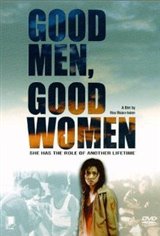
Good Men, Good Women
Good Men, Good Women
Hou Hsiao Hsien rounds out his loose trilogy on Taiwanese history -- The Puppet Master dealt with Japan's occupation of the island and City of Sadness focuses on Chiang Kai-shek's bloody occupation immediately following the war -- with this mediation on the anti-Communist campaign during the 1950s. The story is ostensibly about the real life events of Chiang Bi-yu (Annie Shizuka Inoh), who ventures to China with her new husband, Chung Hao-tung (Lim Giong), to join the anti-Japanese resistance along with three other friends. Once in China, they are immediately suspected of being Japanese spies and are almost executed. While working with the resistance, Chiang is forced to give up her first-born child -- the call of the motherland had no time for motherhood. When the war ends, they return to Taiwan. Chung takes a job as the principal of a school in the south of the island and starts a Marxist journal called the Enlightenment. As the Red Army swept down the Korean peninsula, Chiang Kai-shek -- at the behest of the Americans -- instituted the White Terror, which rooted out communists of every color. Soon Chung and Chiang are rounded up and brutally interrogated. Chiang is eventually released to her small brood of children while Chung is thrown against the wall and shot. Hou complicates this narrative by layering an additional story line about an actress, Liang Ching (also played by Annie Shizuka Inoh), who is rehearsing for a movie about the life of Chiang Bi-yu. Still reeling from the murder of her gangster boyfriend, Ah Wei (Jack Kao), three years previous, Liang is being faxed daily pages of her stolen diary, forcing her to confront her past. Soon the borders between the lives of Chiang and Liang become less and less distinct. This film was dubbed the single best film of the 1990s by Cahier du Cinema.
| Director: | Hou Hsiao-Hsien |
